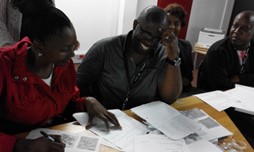|
Saide’s African Storybook (ASb) recently printed 166 000 storybooks! This is in partnership with KwaZulu-Natal Department of Education Library Services (KZN DoE ELITS), Jika’iMfundo (a school improvement programme operating in all schools in two districts of KZN), and Room to Read, (an NGO that provides local language print books for reading, and trains school librarians). Tessa Welch and Lisa Treffry-Goatley report on activities to-date.
Khanyi Dubazana, the Director of KZN DoE Education Library Services (ELITS) is
passionate about reading – she is moving heaven and earth to ensure that, on her limited budget, every child in every grade, in every school in the province, will have storybooks to read. We are privileged to be working with her.
Jika’iMfundo wants to promote reading for pleasure, but had not yet found a way to do this cost-effectively. KZN DoE ELITS is responsible for library development and resourcing in the province – but on a very small budget. They struggle in particular to source appropriate storybooks in isiZulu.
The print "solution" ASb was able to offer them was a Story Starter Pack in isiZulu consisting of an anthology of twelve stories in full colour for the teachers (four stories per grade), together with ten black and white copies of each of the titles for the learners. Because our storybooks are openly licensed, the budget for the library project was able to afford five times as many books than they had anticipated by using traditional suppliers.
The books were delivered early in 2016, for distribution through Jika’iMfundo at their training sessions for teachers. In addition, ASb provided training materials for use of the Story Starter Pack, and undertook the training of the departmental subject advisors late last year. With funding obtained through Jika’iMfundo, we prepared a flashdrive of 100 stories (50 in isiZulu, and 50 in English), together with four videos demonstrating how to use the stories. The goal for ASb’s part of the project is to encourage teachers to realise that although it is good to have storybooks in paper-based format for classroom use, it is possible to have so many more in digital format. With Internet connectivity, teachers can access even more of our free storybooks to read with their pupils.
In the first workshop, we engaged subject advisors in story review, story creation and story translation. Here’s a picture of them absorbed in the task:

The following criteria were generated through discussion in the workshop - for books intended for reading for pleasure:
- Don’t be too strict about the level for a particular grade – there will be capable and less capable learners in each grade.
- Are the sounds and words simple enough for learners at particular levels to read on their own? Is the sentence construction simple enough for learners in a particular grade?
- Does the story have a ‘teaching point’?
- Will the story make the children think? Or appeal to them emotionally?
- Can the illustrations be used to develop children’s visual literacy?
- Are there only a few words to be edited, or is the isiZulu generally not acceptable?
These criteria were applied in a second workshop in March, this time with primary school teachers from Umlazi. In the picture on the left some Grade Two teachers are writing isiZulu translations of the English stories selected, and others are filling in a report on their reasons for selecting or rejecting stories.
If you would like to read their comments on the stories, here they are.
The storybooks selected for the KZN early reading project can be downloaded from Vodacom’s Digital Classroom website.
The success of this initiative has led to a further engagement with KZN DoE Library Services. They have asked us to work on anthologies consisting of 12 storybooks, this time for learners. We are involving subject advisors and teachers in the selection of stories for the anthologies.
In order to ensure sustainability of the African Storybook, we are using these opportunities to explore low cost printing options that are done with the minimum of effort and design time. We are aiming to make it more and more cost-effective to create collections of openly licensed stories and print them.
|



